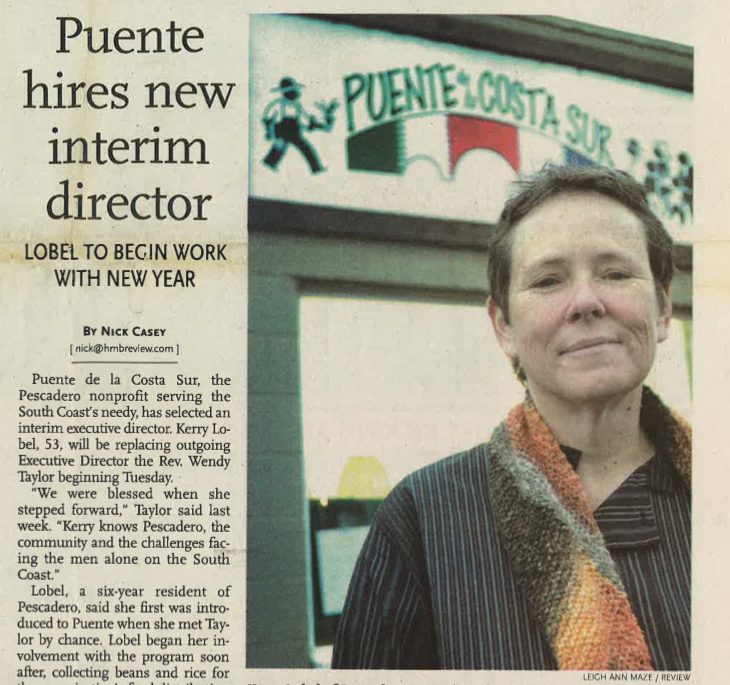Puente Executive Director Kerry Lobel came to Pescadero 13 years ago for what she thought would be a month’s vacation. Then she got involved with Puente as a volunteer, and one month became two. In 2007, she was asked to preside over the merger of Puente and North Street Community Resource Center, and she became Interim Executive Director of Puente. She was such a perfect fit that she decided to stay.
I came to Pescadero because I was leaving a job as executive director for a Washington-based LGBT-rights group and needed a rest. I was pretty tired and not really looking to become involved in anything new. But I think you can’t grow up in California, as I did, without being compelled by the stories of farm workers and the farm worker movement. And the South Coast is a powerful and magical place.
I was interested abstractly in what Puente did, but on my first volunteer day I went to help with the food distribution and I was very touched and moved by the people that I met. They were so hardworking and had such powerful stories, and were so grateful for what I considered so little.
I was really struck by the efforts Puente had made to connect people who wouldn’t normally connect with each other. At that point Puente had given Spanish classes to over 200 English speakers. They had really touched a lot of people on the South Coast just at a basic level, so that people could talk with each other.
I just sort of stepped into a situation that could benefit from some skills that I had. Who knew that for me, it would be a dream come true?
The Puente of today is the heir to 15 years of people working together under a vision that this place could be as beautiful inside as it was on the outside. That by working together, we could overcome some of the challenges larger communities face. And I still believe in that.
The world of 15 years ago was a world before 9/11. The borders were much more porous. We had a lot of families that had been here for many years, but also a regular group of mostly men that would go home to Mexico in the winter and return to Pescadero for the farming season.
Following 9/11, the mobility that people had to go home to Mexico and come back to Pescadero went away, literally overnight. People began staying longer in Pescadero as the costs of crossing the border became more expensive and border violence due to drug-trafficking became more dangerous.
As more people stayed, it created the necessity and opportunity to develop long-term programming for people who were here. This is the climate in which we operate: there are people who live in the shadows because they don’t have a path to legal residency. We have farmers who are struggling to make a living and decreasing the hours they can offer to workers because of the globalization of food and flowers. Both communities are looking to sustain our rural way of life.
There is no other organization in our region that does what we do. We are one of a kind. Our isolation creates an opportunity to really consolidate programming and services and make a real one-stop shop here. And we do it with an amazing amount of heart.





